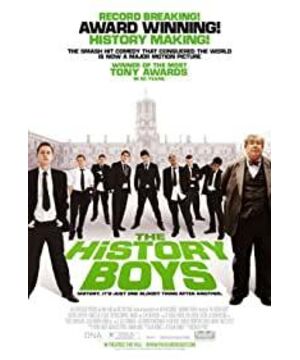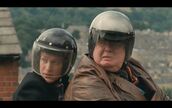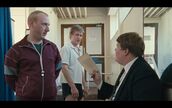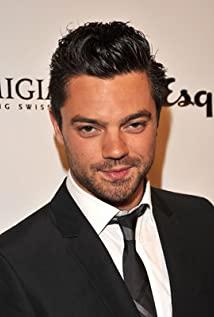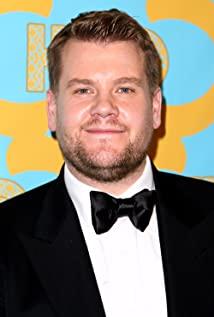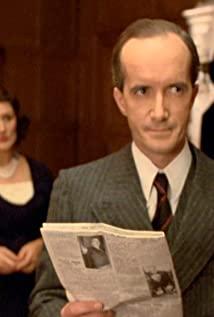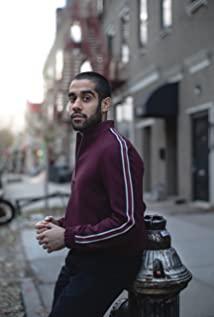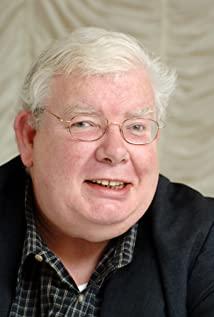I was amazed at the beginning that they fit so much in such a 100 minute film, no ramblings or shots, every minute makes me feel. After checking the information, I found out that it turned out to be a movie adapted from a drama, which indeed explains a lot. First of all, I personally think that the actor's line skills are higher than that of pure film and television actors, and there is no strong accent. Another good thing is that the performance does not have too many stage marks, and there is no feeling that the performance is too forceful, it is very natural. But as far as the whole film is concerned, it does not reflect the advantages of this form of film, as if it is taking you to watch the drama through the lens. The lens doesn't change much, and it's relatively fixed when shooting faces. The benefit is that it allows people to better appreciate the actor's performance.
No matter what angle the film is viewed from, the theme, color, background... all have two big characters - UK. The main line of the film is the Oxbridge exam, and the sub-line is the issue of homosexuality.
Different from the Dead Poets Society, the students here do not need a rebellious teacher to lead them to break through stereotypes, but a teacher to help them pass the university exam and exam-oriented education. These 8 students worked very hard. Every time I saw them rushing to the library to borrow books after class, I was very moved. I was moved by their diligent attitude. The old man advocates learning for the pleasure of knowledge itself, and the new teacher tells them what the examiner wants. However, unlike the exam-oriented education in the impression, the new teacher requires the students to show everything they know and try to think hard to discover angles that others can't think of. And the reason why those students can memorize a lot of poem fragments is the foundation laid by the old teachers. The film brings to mind a question that has long plagued and will continue to haunt the educational and psychological worlds: how do we select talent? We have gone from relying on birth, race, blood, to now relying on exams, and the world is what it is now. Whether you train students to recite knowledge or learn to create or improve quality (what is quality, that is another topic), in the end there is always an exam, and if there is an exam, there will be exam-oriented education, which is not a Chinese characteristic. Faced with the reality of the exam, the fun of talking about knowledge is really useless. British cinema is quite realistic at some moments, but ridiculously naive at other times.
Since the story takes place in a boys' grammar school, considering how popular homosexuality is now, it's a waste of material not to show it. Li Yinhe's books on homosexuality and sadomasochism all cite British boys' schools as examples. I've always had an idea that the older a country is, the more open it is. For example, Europe is more open and accepting things than the United States. After all, there is nothing too new under the sun, and many new ideas that are unacceptable now have ancient roots.
Hector, discussing the beauty of Hardy writing with students, harassing students on the way out of school, old and fat homosexual, pessimistic like all intellectuals, likes gerund construction, that's the kind of existence. I believe his teaching is useful because God knows what will work for you, so learning everything is the same. It's just that before the exam, he looks out of place. The film doesn't fail to focus on his teaching, it's just a few wonderful mentions, but his private life is the real gimmick. Every day after school, I have to take students by the way, and then ride a motorcycle while sexually harassing him... Before questioning his personality, I want to confirm the difficulty of the action. After all, it is not an easy task for a person who weighs more than 200 pounds to hold the handlebar with one hand and reach back with one hand. Why would he do this? He defended himself with "give", which sounded like a perverted serial rapist. These people see crime as doing good deeds. So even his colleagues could not listen to such a clumsy justification. But as far as students are concerned, what are their attitudes towards his harassment? The answer is: not particularly disgusting. After all, same-sex massage on a country road is a very exciting experience for 17- and 8-year-old boys, I guess. And obviously, some students who can't understand this matter, he doesn't touch it. There's a minimum of morality. Isn't this a convenience for being same-sex? Imagine if a male teacher harassed a female student or a female teacher harassed a male student? Things are going to be big. In this regard, the students' evaluation of him is: a joke.
Irwin, the superficial personality is very different from the real self. As a teacher, he was sharp, aggressive, and unscrupulous; as a person, he was cautious and unwilling to reveal himself. He could be Homo or BI, it's not clear, but he doesn't really care, he accepts people who are attractive to him. He was erudite and charismatic as a teacher, and popular playboys worked hard to please him until they looked like him. He liked Darkin from the beginning, but just like a teacher who likes interesting students, until the other party used the beginning of World War II to hint and confess to him, which is quite unusual. But he clearly understood the hint, and his performance showed that he liked him, one for another. In the end, when Darkin came to tell him, he pretended to be shy and agreed only if he was forced to confront him. I think it's because he has too many secrets to keep, so he's building an alter ego. It is said that this character is more cunning in the talk play, and the conflict with Teacher Hector is more intense, and it is not as likable as in the movie.
Darkin, male and female at school, fooling around with the principal's secretary while trying to seduce the teacher, confusion, confusion, can only be explained by adolescence. Although he is the protagonist, I can't dig too much right now, maybe because he is too typical.
The little Jew, desperately in love with Darkin, has low self-esteem, is sensitive, but has courage. He sang to Darkin like an angel. The actor perfectly showcases his multifaceted character traits.
Christian, from my aesthetic point of view, is quite handsome. What's interesting about him is that, as a devoutly religious man, he's best with a Jewish homosexual, and is more sensitive to the Holocaust concentration camps. He's okay with sitting in the back seat of Hector, I guess because his beliefs dictate that he can't masturbate, so he finds another way out...and that's probably why he's so gossipy.
Teacher Totti, one of the two women in the film with lines. It is said that when the play was staged in the United States, she won the TONY Award for this role. This really makes me want to watch the drama. In the film, her performance is too little. Although she is very powerful, it is still too little.
The other students didn't show much in the film, because of the time, a lot of cuts were made. I believe that the original work should be very interesting, there are hippies, fat people, sports talents, and black people and Muslims should not only exist as symbols of diversity like in the movie.
I really hope to see the drama, after all, these people can't continue to act, not all ages can act as high school students.
View more about The History Boys reviews


